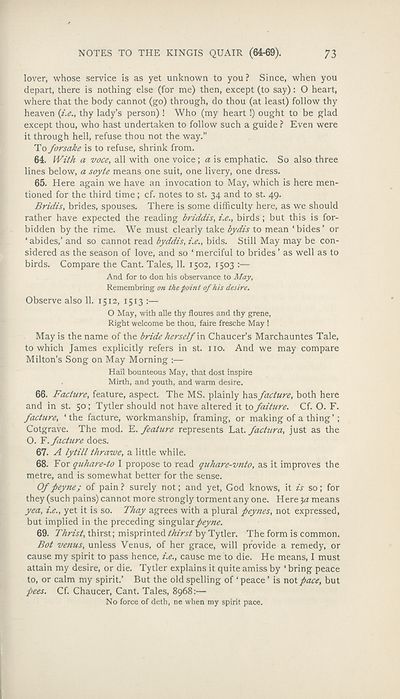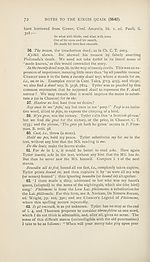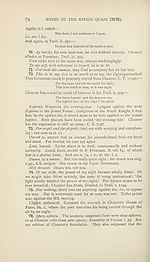Download files
Complete book:
Individual page:
Thumbnail gallery: Grid view | List view

NOTES TO THE KINGIS QUAIR (64-69).
73
lover, whose service is as yet unknown to you? Since, when you
depart, there is nothing else (for me) then, except (to say): O heart,
where that the body cannot (go) through, do thou (at least) follow thy
heaven (i.e., thy lady’s person) ! Who (my heart !) ought to be glad
except thou, who hast undertaken to follow such a guide ? Even were
it through hell, refuse thou not the way.”
To forsake is to refuse, shrink from.
64. With a voce, all with one voice; a is emphatic. So also three
lines below, a soyte means one suit, one livery, one dress.
65. Here again we have an invocation to May, which is here men¬
tioned for the third time ; cf. notes to st. 34 and to st. 49.
Bridis, brides, spouses. There is some difficulty here, as we should
rather have expected the reading briddis, i.e., birds ; but this is for¬
bidden by the rime. We must clearly take bydis to mean ‘ bides ’ or
‘abides,’ and so cannot read byddis, i.e., bids. Still May may be con¬
sidered as the season of love, and so ‘ merciful to brides ’ as well as to
birds. Compare the Cant. Tales, 11. 1502, 1503 :—
And for to don his observance to May,
Remembring on the point of his desire.
Observe also 11. 1512, 1513 :—
O May, with alle thy floures and thy grene,
Right welcome be thou, faire fresche May !
May is the name of the bride herself va Chaucer’s Marchauntes Tale,
to which James explicitly refers in st. no. And we may compare
Milton’s Song on May Morning :—
Hail bounteous May, that dost inspire
Mirth, and youth, and warm desire.
66. Fadure, feature, aspect. The MS. plainly has fadure, both here
and in st. 50; Tytler should not have altered it to failure. Cf. O. F.
fadure, ‘the facture, workmanship, framing, or making of a thing’;
Cotgrave. The mod. Y.. feature represents Lat. fadura, just as the
O. Y. fadure does.
67. A lytill thrawe, a little while.
68. For quhare-to I propose to read quhare-vnlo, as it improves the
metre, and is somewhat better for the sense.
Of peyne; of pain ? surely not; and yet, God knows, it is so; for
they (such pains) cannot more strongly torment any one. Here means
yea, i.e., yet it is so. Thay agrees with a plural peynes, not expressed,
but implied in the preceding sm'gvXzxpeyne.
69. Thrist, thirst; misprinted thirst by Tytler. The form is common.
Bot venus, unless Venus, of her grace, will provide a remedy, or
cause my spirit to pass hence, i.e., cause me to die. He means, I must
attain my desire, or die. Tytler explains it quite amiss by ‘ bring peace
to, or calm my spirit.’ But the old spelling of ‘ peace ’ is not.pace, but
pees. Cf. Chaucer, Cant. Tales, 8968:—
No force of deth, ne when my spirit pace.
73
lover, whose service is as yet unknown to you? Since, when you
depart, there is nothing else (for me) then, except (to say): O heart,
where that the body cannot (go) through, do thou (at least) follow thy
heaven (i.e., thy lady’s person) ! Who (my heart !) ought to be glad
except thou, who hast undertaken to follow such a guide ? Even were
it through hell, refuse thou not the way.”
To forsake is to refuse, shrink from.
64. With a voce, all with one voice; a is emphatic. So also three
lines below, a soyte means one suit, one livery, one dress.
65. Here again we have an invocation to May, which is here men¬
tioned for the third time ; cf. notes to st. 34 and to st. 49.
Bridis, brides, spouses. There is some difficulty here, as we should
rather have expected the reading briddis, i.e., birds ; but this is for¬
bidden by the rime. We must clearly take bydis to mean ‘ bides ’ or
‘abides,’ and so cannot read byddis, i.e., bids. Still May may be con¬
sidered as the season of love, and so ‘ merciful to brides ’ as well as to
birds. Compare the Cant. Tales, 11. 1502, 1503 :—
And for to don his observance to May,
Remembring on the point of his desire.
Observe also 11. 1512, 1513 :—
O May, with alle thy floures and thy grene,
Right welcome be thou, faire fresche May !
May is the name of the bride herself va Chaucer’s Marchauntes Tale,
to which James explicitly refers in st. no. And we may compare
Milton’s Song on May Morning :—
Hail bounteous May, that dost inspire
Mirth, and youth, and warm desire.
66. Fadure, feature, aspect. The MS. plainly has fadure, both here
and in st. 50; Tytler should not have altered it to failure. Cf. O. F.
fadure, ‘the facture, workmanship, framing, or making of a thing’;
Cotgrave. The mod. Y.. feature represents Lat. fadura, just as the
O. Y. fadure does.
67. A lytill thrawe, a little while.
68. For quhare-to I propose to read quhare-vnlo, as it improves the
metre, and is somewhat better for the sense.
Of peyne; of pain ? surely not; and yet, God knows, it is so; for
they (such pains) cannot more strongly torment any one. Here means
yea, i.e., yet it is so. Thay agrees with a plural peynes, not expressed,
but implied in the preceding sm'gvXzxpeyne.
69. Thrist, thirst; misprinted thirst by Tytler. The form is common.
Bot venus, unless Venus, of her grace, will provide a remedy, or
cause my spirit to pass hence, i.e., cause me to die. He means, I must
attain my desire, or die. Tytler explains it quite amiss by ‘ bring peace
to, or calm my spirit.’ But the old spelling of ‘ peace ’ is not.pace, but
pees. Cf. Chaucer, Cant. Tales, 8968:—
No force of deth, ne when my spirit pace.
Set display mode to: Large image | Zoom image | Transcription
Images and transcriptions on this page, including medium image downloads, may be used under the Creative Commons Attribution 4.0 International Licence unless otherwise stated. ![]()
| Publications by Scottish clubs > Scottish Text Society publications > Old series > Kingis quair > (133) |
|---|
| Permanent URL | https://digital.nls.uk/106994071 |
|---|
| Description | A collection of over 100 Scottish texts dating from around 1400 to 1700. Most titles are in Scots, and include editions of poetry, drama, and prose by major Scottish writers such as John Barbour, William Dunbar, Gavin Douglas, and George Buchanan. Edited by a key scholarly publisher of Scotland's literary history, and published from the late 19th century onwards by the Scottish Text Society. Available here are STS series 1-3. |
|---|

